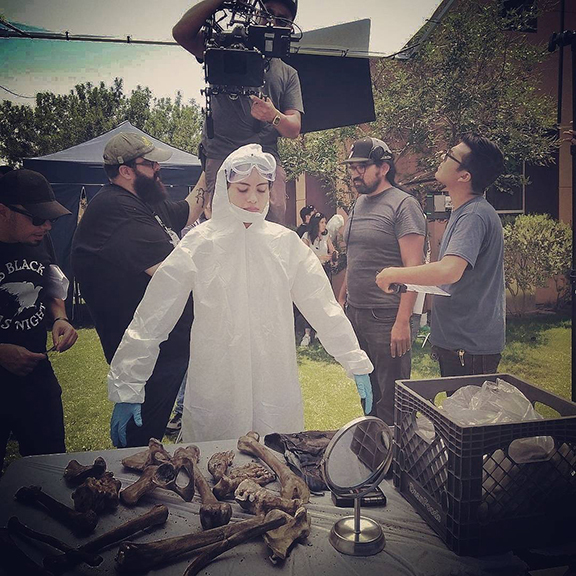According to the Guardian, almost 60 percent of film studies graduates went directly into full-time employment in 2009. They varied from several jobs in the field, and some were lucky to land the director’s chair, some were able to land jobs in design within the industry, whereas 34 percent found work in retail and catering.
Obtaining a film degree does have its advantages, such as a hands-on experience on sets and creating connections.
Such was the case for Carlos De la Torre, senior major in history. He and his production team at Tower Productions rented a theater at the Alamo Drafthouse Cinema and premiered their first feature film, “Depth of Field,” in front of cast, crew and family members before they sent it out to a film festival.
“Two things I find very beneficial is that number one, first and foremost, you make connections. Most of my production company I met in college. You meet other people who are just as passionate about film just as you are,” De la Torre said.
Earning a degree in film doesn’t mean the person who didn’t attend film school can’t make it in the business. They just face more adversity.
English professor Justin Stone, who graduated from the University of Southern California School of Cinema-Television discussed how careers in cinema involve a hands-on approach, along with trial and error as you gradually move up the ranks ,from starting out as a production assistant to editor or director.
“One can certainly learn many things about this craft just by working on projects, working in the field, teaching yourself with diligence,” Stone said. “I know numerous professionals who didn’t go to film school, but spent years working their craft, putting in countless hours as assistants and apprentices, who now work in the business.”
Stone also explained just how a filmmaker can make it without the perks of film school.
“Not everyone has to go to film school, one can master their techniques without it. It’s whether or not they want to put the hard work and dedication to strive for a career in cinema whether or not it is in a particular field in cinema or it’s behind the director chair,” Stone said.
Communication professor Ramón Villa actually recommends attempting both film school and just going out there and trying it.
“Film school provides a network of collaborative artists to pick and choose from to work on your project,” Villa said. “Always experiment by yourself. It’s a craft, a discipline. You put in the work and you’ll see results.”
But is a career in film a reliable source of income?
Stone said he actually risked it all in order to create a feature of his own. After a couple years in production, Stone fell into debt for his project because of a lack of distribution for the film. It took him 10 years to pay off the debt he sustained in his self-financed movie.
“I ended up making a self-financed independent feature movie and went into debt when I couldn’t figure where to place the movie or how to sell it,” Stone said.
De la Torre, who works with three other people on his production team, also said there are obstacles to being an independent filmmaker and a working at his own production company, which also handled the budget for his latest feature.
“Everything, for the most part, comes out of pocket,” De la Torre said. “When you’re an independent filmmaker, you work with what you have, so a lot of times that fuels your creativity, to say I only have this much, I only have these set of props, I have this location, what can I do with this? The biggest thing is feeding our cast and crew, we spent one-third of the budget toward making sure our people are taken care of.”
Stone also highlighted specializing in a part of production in order to have a steady income.
“Some are able to make it a reliable source of income because, largely, they focus in on a particular career in the field,” Stone said. “For example, working as a director of photography, or editor, or union gaffer, grip or electric. You have to hustle and work hard and get very good at your specific craft, as well as a be a people person.”
Locally, the El Paso Film Commission is set to help local filmmakers with their productions. Susie Gaines, the film commissioner, said they help with casting calls and general outreach.
“We are happy to post information on their casting and crew calls on our Facebook page and work with them on any permitting they may need, offering any suggestions we have that may help them as far as a location, crew, resources, setting up meetings with contacts they need for a location, whatever it might be, we are always here for them,” Gaines said.
For De la Torre, the hard work is just a step in the of a creative process.
“We have dreams man, and we want to make them come true and sometimes that means having to pay the price,” De la Torre said.






